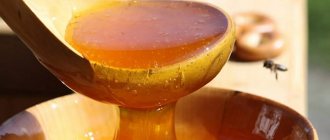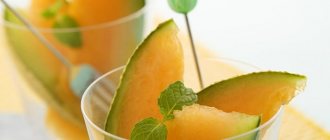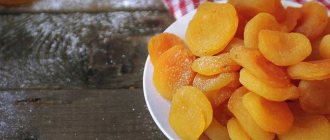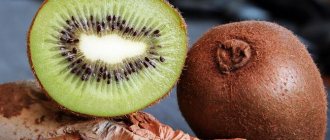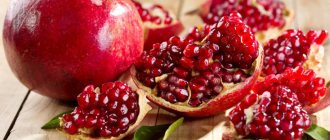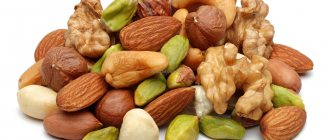Kefir is part of any diet, including during lactation. Is kefir really so beneficial for breastfeeding or are there “pitfalls” and a nursing woman needs to use the fermented milk product carefully? Indeed, in addition to being a source of calcium and normalizing the gastrointestinal tract, kefir contains such controversial lactose.
Fresh kefir during breastfeeding is very useful for a nursing mother in the absence of individual intolerance to the product.
The benefits of kefir during breastfeeding
The components of dairy products must be present in the diet of a nursing woman. But it happens that, remembering the boiled drink with foam from childhood, a young mother does not want to drink fresh milk. Or the baby reacts sharply to the mother’s consumption of dairy products. Then you should drink kefir while breastfeeding and other fermented milk drinks, which are much better absorbed by the body and, unlike milk, are already ready for consumption.
The beneficial bacteria contained in kefir break down casein (a protein found in dairy products), making it useful for the digestion of a woman who has recently given birth. They help get rid of problems with constipation, which often bother nursing mothers immediately after childbirth. At the same time, kefir stimulates lactation, quenches thirst and serves as a good alternative to tea after a hearty lunch. It saturates the intestines with beneficial bacteria, restores microflora, eliminating harmful microbes.

With a healthy digestive system, this drink can eliminate the heaviness and increased gas formation.
But if a nursing woman has high stomach acidity, then use kefir with caution. It has also been established that fermented milk product has antioxidant properties, combining free radicals and removing them from the body. After all, a healthy digestive system is extremely important for protecting women's health. This includes strong immunity and normal metabolism in both mother and child. As well as a stable psyche and a strong nervous system.
What do pediatricians think?
Children's doctors believe that kefir can be consumed while breastfeeding. The drink contains vitamins B, E, C and so on. The product is also rich in calcium, phosphorus, zinc and other microelements. A new mother really needs them during this period.
However, doctors make a reservation regarding whether it is possible to drink kefir while breastfeeding. It is better to protect a newborn who suffers from colic from such food. A fermented milk drink can cause fermentation in the mother’s stomach and intestines. All this has an undoubted impact on the baby’s well-being. The product can be safely consumed after the baby’s intestines are filled with beneficial microorganisms.

Harm of kefir
Like all other categories of products, kefir is useful for breastfeeding only in fresh form, made from natural milk. You should not combine drinking with meat and fish dishes, as well as legumes or nuts, as this will lead to digestive upset. Excessive portions of the product cause similar symptoms. Breastfeeding mothers with gastrointestinal diseases and those suffering from anemia should not consume kefir, since some of the iron is removed from the body along with pathogenic flora. If a fresh product aged for one day is useful and cleanses the body, then a drink that is infused for more than three days, on the contrary, tastes unpleasant and contains such negative components as ethanol and gases. Drinking such an “old” drink leads to bloating and constipation.
How often can you drink kefir during lactation?
A nursing mother can drink kefir if the child tolerates dairy products in her diet well. Usually babies do not show concern when a nursing woman drinks about 250-300 ml per day; such a volume of drink will not cause harm. However, by drinking 500 ml or more, you risk causing frequent regurgitation, indigestion or constipation, skin rashes and other undesirable symptoms in the child. If you are too carried away by the drink and find the listed symptoms in your baby while lactation continues, reduce the portion to one glass per day, and the symptoms will disappear.
A baby may react negatively to fermented milk products not only due to allergies. Kefir contains a lot of enzymes, and the immature digestive system is not yet ready for such tests. Therefore, consumption should be moderate.
How does kefir affect milk production, the female body and infants?
Like all milk derivatives, kefir saturates the body with useful microelements: calcium, phosphorus, zinc, magnesium, iodine, vitamins C, H, B and many others. But fresh milk quite often causes allergies in infants, and kefir is a less allergenic product. You can talk about an allergic reaction if your baby has the following symptoms:
- increased regurgitation;
- problems with bowel movements, rare stools;
- frequent, unreasonable whims;
- pain in the tummy with intestinal colic in a child;
- weak appetite, refusal to eat.
Consumption of kefir has a beneficial effect on a woman who is breastfeeding:
- Weight loss - kefir can be drunk after meals, instead of sweet tea, or as a substitute for the main dish.
- Boosting immunity.
- Cleansing the body after drug treatment with antibiotics.
- Replenishment of protein reserves, which are easier and faster to digest than from milk.
- Strengthening the nervous system, which undergoes significant stress due to lack of sleep and constant care for the baby.
- Improving complexion, condition of skin and hair, thanks to the consumption of valuable microelements, vitamins and amino acids, a woman looks much more attractive.
- Stabilization of fat balance.
- Improvement of the vascular system.
- Activation of the hormone of happiness - serotonin and melatonin, in a nursing woman, sleep is normalized and mood improves.
- Thanks to the increased calcium content, the condition of teeth and hair improves. One serving of kefir contains a quarter of the daily requirement of a valuable substance.
- Promotes milk production.
- Drinking the drink is a good prevention against thrush.
Diet for breastfeeding according to Komarovsky

diet according to Komarovsky When creating a menu for a nursing mother, you should listen to the recommendations of leading pediatricians. In particular, you can take as a basis the nutritional rules for breastfeeding women from Dr. Komarovsky.
- We exclude canned, smoked, refined products and semi-finished products from the menu.
- It is necessary to adhere to a balanced diet, and therefore the daily menu must contain all the necessary proteins, fats and carbohydrates, vitamins and minerals. This diet includes fermented milk products, cereals, fish, vegetable and animal oils, fruits, vegetables, bread, and flour products.
- The daily diet should be divided into at least 4 meals. If a young mother wants to quickly lose weight after giving birth, then instead of cutting back on the diet, it is worth dividing it into 6 or 7 servings - fractional meals will allow the body to activate metabolic processes, and the child will not be deprived of the necessary nutrition.
- For normal lactation, a woman must consume enough fluid - in the first months of a child’s life it is better not to consume cow’s milk at all, but to drink weak, sweet tea.
- As for cooking methods while breastfeeding, you should avoid frying and smoking, while steaming, baking, and stewing are welcome.
- When choosing cereals for porridges, you need to opt for whole grain porridges - buckwheat, oats, pearl barley, etc. are useful for a young mother.
- When consuming dairy products, a nursing mother should choose a variety of processed milk options, from kefir to cottage cheese and fermented baked milk.
- To meet the need for elements such as iodine, iron and calcium, it is worth including fish, seafood and seaweed, spinach, kefir, and cottage cheese in your diet.
- Fiber is an important element of normal digestion for women. It is also worth eating foods containing folic acid - bananas, oranges, legumes, Brussels sprouts.
Contraindications
In addition to poor digestion, contraindications for use include:
- allergy to cow's milk protein - often a reaction to the product can occur if it was previously noticed in the mother. In addition, the occurrence of such a reaction can be provoked by pregnancy with complications, residence in an ecologically unsuitable area, or fetal hypoxia during difficult childbirth. In this case, the allergy can be either permanent or go away over time.
- Lactase deficiency is mainly a hereditary reaction. It manifests itself in the body’s inability to produce the appropriate enzymes that can break down sugar in milk. This is a congenital trait that requires a strict diet throughout life.
- alcohol content - ethyl alcohol released during fermentation, although it does not cause significant harm to the child, is still contained in the aged drink. For a nursing woman, only kefir with an alcohol dosage of up to 0.6 percent is allowed for consumption. That is, a young, fresh drink, aged no more than a day.
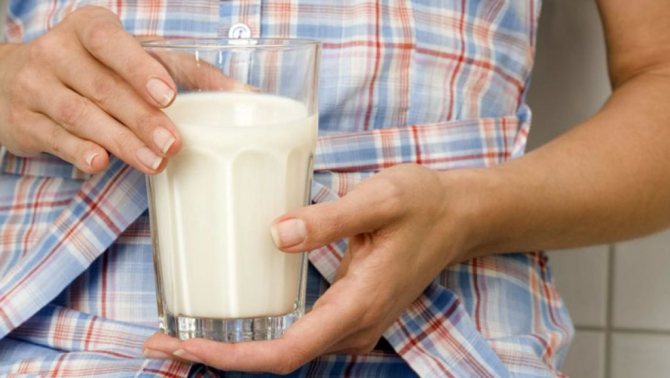
In order for the use of kefir during breastfeeding to bring maximum benefits, you need to follow some rules, observe moderation and monitor your reaction and the baby’s behavior.
How to introduce a product into a nursing menu
The first portion that a mother can afford should be minimal - only half a cup for testing. In this case, it is better to drink kefir at a comfortable temperature (room temperature) in the morning. Over the next 24 hours, the mother monitors the child’s condition and his reaction. If negative consequences appear - colic, regurgitation, then it is better to stop using the product. And you can try the ingredient again no earlier than in a month.
Is it possible for a woman to consume kefir in the first month after childbirth?
In practice, this is a very ambiguous question, since some lactation consultants advise starting to drink kefir after a week has passed from the day of delivery. But in parallel, there is an opinion that kefir is allowed for use during lactation only after the third month of feeding. In the first month of his life, the newborn is just getting used to the environment and the nutrition provided by his mother. His body is under enormous stress, the child suffers from intestinal colic, which is why a nursing woman is not recommended to introduce a large number of new foods into her diet.
Daily norm
After the positive effect of the product on the baby, a nursing woman can drink kefir without fear. Moreover
For the first few months, you still shouldn’t drink more than 150 grams per day. The dosage can be increased only after the third month of life. Then you can increase the portion by 50 grams daily.
Even after such a long period of adaptation, in the following months you should not drink more than half a liter of drink per day. This is the optimal daily norm, and it is recommended to drink this volume throughout the day, not at one time. For example, replace the last snack before bed with a glass of kefir, and during the day drink a fermented milk drink in small portions.
What can you drink kefir with during breastfeeding?
A nursing mother is allowed to drink kefir both in pure form and with a light snack. And to diversify the menu of a woman who is breastfeeding, you can add kefir to other equally healthy drinks and dishes. For lunch, mom can make herself a kefir-based soup, and replace the afternoon snack with a fruit salad with a healthy drink dressing. And as a complete snack, you can mix a fermented milk product with tomato juice, dill and nuts - you will get a nutritious vitamin drink.
Diet while breastfeeding
A nursing mother should not choose foods at her own discretion. It is necessary to listen to the advice of pediatricians , for example, you can take diet recommendations from Dr. Evgeniy Komarovsky as a basis.
Smoked, canned foods, as well as semi-finished products should be excluded from the menu and not consumed during breastfeeding.
To ensure a balanced diet, it is necessary to include in the diet menu the required amount of proteins, fats and carbohydrates, as well as vitamins and minerals. The daily menu should include fermented milk products, fruits, vegetables, meat and fish, cereals, flour products, vegetable fats, and bread.
It is advisable to divide meals into 4 meals or more. If you want to lose excess weight, then you should strive not to cut down your portion, but to divide it into several times. Thanks to the diet, fractional meals, metabolic processes will occur more actively in the body and the child will be able to receive adequate nutrition from the mother.
For good lactation, the mother must drink more fluids. Mild but sweet tea is especially useful . It is better to refrain from drinking cow's milk in the first months.
During breastfeeding, mothers should avoid fried foods. It is advisable to steam, stew or bake food.
Among the cereals welcome are buckwheat, pearl barley, oats, and all whole grain cereals, from which tasty and healthy porridges are prepared.
It is worth giving preference to such dairy products as fermented baked milk, cottage cheese, kefir, and processed milk. You should try to include a variety of dairy products in your diet menu.
Large amounts of iodine, iron and calcium, which are necessary for the baby, are found in seaweed, spinach, cottage cheese, fish, and seafood . They should definitely be consumed regularly by a nursing mother.
Fiber helps improve the digestive system, so you need to eat foods that contain it. Don't forget about folic acid; it is found in bananas, Brussels sprouts, oranges, and legumes.
If you take into account the advice of a famous pediatrician, the young mother’s diet menu will include everything necessary for the full development of the child. All these vitamins and microelements will enter the baby’s body with mother’s milk.
Is it possible for nursing mothers to go on a kefir diet?
Probably every woman strives to get her body in shape as soon as possible after giving birth. And to get rid of extra pounds, some mothers resort to a kefir diet, but sometimes such a diet can do more harm than good. With such a diet, milk production decreases and natural feeding alone may not be enough for the baby.
A one-day diet should be balanced and varied, so a woman during lactation should not have fasting days on kefir alone .
If the baby has already grown up (over a year), tolerates the product well and the mother loves the drink, then you can arrange a weekly diet of the following sample.
— Monday: add potatoes (5 pcs.) to half a liter of kefir;
— Tuesday: sour cream is served with kefir (0.5 l) (one glass per day);
— Wednesday: fresh cottage cheese (up to 200 grams) is a plus for the drink;
- Thursday: a more eventful day - 0.5 liters of drink and 0.5 kg of boiled chicken;
- Friday: eat apples with fermented milk product - 1 kg per day;
- Saturday: differs in the use of only liquid - 1 liter of kefir;
— Last day — 2 liters of water without gas.
With such a strict diet, you can lose up to 7 kg in a week. However, during the diet you should not eat after six in the evening.
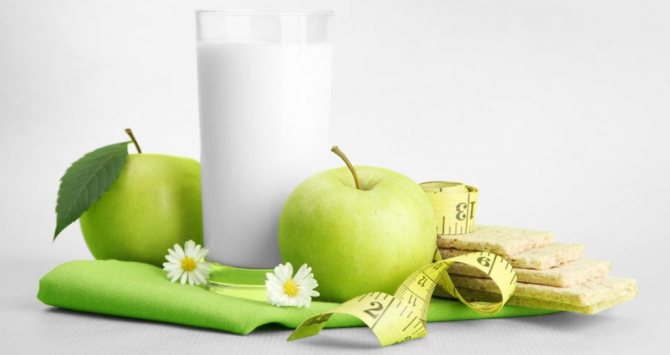
The kefir diet is recommended for mothers who supplement their babies with formula, or if they already eat a fairly large amount of complementary foods.
How can a nursing mother choose healthy kefir?
When purchasing a valuable drink in a store, you need to read the information on the label; you can buy the product if:
- This is a product from a well-known manufacturer - everyone knows the brand.
- Short shelf life - for nursing mothers you can buy a drink with a shelf life of no more than a week.
- A product of medium fat content - it is optimal to choose kefir with a fat content of up to 2.5%, since low-fat and too fatty drinks contain other, completely unnecessary ingredients.
- Glass or cardboard containers.
If some parameters are not met, then you should postpone the purchase.
Kefir with additives for a nursing woman
The composition of the product is no less important than all of the above conditions. For a nursing woman, it is better to purchase a product containing only milk and starter culture. Products with additives from berries and fruits should not be eaten. If possible, these same ingredients can be added to the drink yourself at home. Then mom will be confident in the quality of these supplements.
How to choose healthy kefir?
Kefir can be different, therefore, so that the baby does not have a negative reaction to a new product in the mother’s diet, the choice of fermented milk drink should be taken with full responsibility.
- Evaluate the shelf life of the drink - for a high-quality natural product it is minimal;
- choose only fresh one-day product for your diet and do not store it for a long time;
- It’s better to purchase not “branded” drinks, but those produced by a local supplier - they are guaranteed to be fresh and natural;
- there should be no excess in the composition - only sourdough and whole milk;
- do not think about your figure when choosing a fermented milk drink, buy regular kefir with normal fat content - low-fat products undergo processing, during which the drink may contain substances harmful to lactation;
- evaluate the degree of swelling of the packaging - even in a fresh product, if transported and stored incorrectly, active processes of development of lactocolony can begin, which will turn it into “old” kefir, which is not recommended for use during breastfeeding.
Kefir is an incredibly valuable product that you don’t have to give up during breastfeeding. A properly selected drink and its moderate consumption will only bring benefits to both mother and baby.
What are the benefits of homemade kefir?
First of all, the drink prepared at home meets all requirements and consists only of high-quality raw materials. This is fresh milk without the addition of various impurities. When preparing such a drink, you can independently regulate the fat content of the drink and its aging, which affects the taste.
How to make kefir at home
Milk is taken homemade or purchased, but fresh and with an average fat content. It is boiled, cooled, and then poured into sterilized glass containers. Add starter to it in accordance with the dose recommended on the label (usually 10 grams per 1 liter of water), mix and cover with a cloth. Place the container in a warm place and wait for it to thicken, then leave it for the required number of days and drink the pre-strained ready-made drink. The starter can be washed and reused by adding another portion of milk.
Every nursing woman should eat kefir and fermented milk products. In this case, you need to look at the state of your child’s health and your own feelings, buy the right, fresh product or cook it at home.
